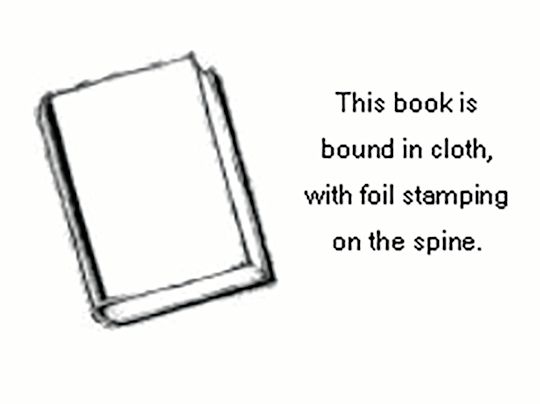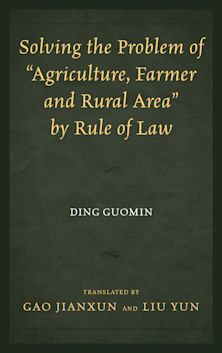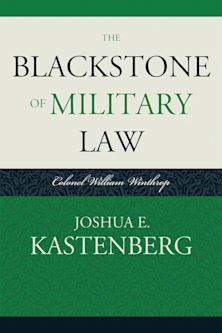- Home
- ACADEMIC
- Law
- Law - Other
- Peace with Justice?
Peace with Justice?
War Crimes and Accountability in the Former Yugoslavia
- Textbook
Peace with Justice?
War Crimes and Accountability in the Former Yugoslavia
- Textbook
Buy from Bloomsbury eTextBooks
You are now leaving the Bloomsbury Publishing website. Your eBook purchase will be with our partner https://www.vitalsource.com.
Your credit card statement will show this purchase originating from VitalSource Technologies. They will also provide any technical assistance you might require.
You must sign in to add this item to your wishlist. Please sign in or create an account
Description
Resolving the Yugoslav conflict was the last great foreign policy challenge of the twentieth century. Never before in history was so much emphasis placed on the need to employ the concept of justice in the peace process or was so much energy devoted to creating and utilizing international justice-based institutions. In this provocative and insightful book, two former State Department lawyers, Paul R. Williams and Michael P. Scharf, undertake to tell the true story, "warts and all," of the role of justice in building peace in the former Yugoslavia.
During the Yugoslav conflict, Serb leader Slobodan Milosevic was transformed from a key partner in peace to an indicted war criminal, who now sits in a 10 x 17 foot cell at the International Criminal Tribunal in The Hague. But the road from accommodation to accountability in the Balkans was anything but smooth. Based on their personal experience, extensive research, and interviews with key players in the Yugoslav peace-building process, Williams and Scharf provide a gripping account of how and why justice was misapplied and mishandled throughout the peace-builders' efforts to settle the Yugoslav conflict.
All too often human rights and peace advocates treat justice as a panacea for conflict and atrocities, while self-proclaimed realists and professional diplomats dismiss justice as an impediment to peace. Williams and Scharf demonstrate that the truth lies in between. Their definitive study provides a novel framework for understanding the utility of justice as well as its practical limits as a diplomatic tool so that it can be more effectively applied in resolving future conflicts around the globe.
Table of Contents
Chapter 2 The Cognitive Contextual Process: Melding International Relations and International Legal Theory
Chapter 3 Justice and Anti-Justice: The Functions of Accountability in the Peace-building Process
Chapter 4 Peace vs. Justice: The Relationship between Accountability and Other Relevant Peace-building Approaches
Part 5 Part II: Precursors to Justice: Self-Identity, Political Will, and Moral Obligation in the Peace-building Process
Chapter 6 The Road to War: War Crimes and the Crime of War in Yugoslavia
Chapter 7 The International Response: Self-Interest Wrongly Understood
Part 8 Part III: Creating and Employing Justice Based Institutions During the Initial Phases of the Peace-building Process
Chapter 9 Establishing the Yugoslav War Crimes Commission and Yugoslav Tribunal: A Judicial Placebo
Chapter 10 The Operation of the Yugoslav Tribunal: A Record of Self-Imposed Limits
Chapter 11 The International Court of Justice: A Blunt Tool for Peace-building
Part 12 Part IV: The Role of Justice in the Negotiation Phase of Peace Building
Chapter 13 The Dayton Negotiations: Getting to Yes with War Criminals
Chapter 14 Seeking Peace in Kosovo: The Relegation of Justice
Chapter 15 The Rambouillet/Paris Negotiations: From Coercive Appeasement to Humanitarian Intervention
Part 16 Part V: The Role of Justice in the Implementation Phase of Peace-building
Chapter 17 Apprehending War Criminals: Mission Creep or Mission Impossible?
Chapter 18 Linking Justice and Economic Inducements: A Road to Peace
Chapter 19 The Cohabitation of Justice and Peace: Concluding Observations
Product details
| Published | 27 Aug 2002 |
|---|---|
| Format | Ebook (Epub & Mobi) |
| Edition | 1st |
| Extent | 352 |
| ISBN | 9781461640646 |
| Imprint | Rowman & Littlefield Publishers |
| Series | The New International Relations of Europe |
| Publisher | Bloomsbury Publishing |
About the contributors
Reviews
-
A rich, complex and nuanced presentation of the various motivations and perceptions driving American and European policy on the violence and war crimes in the Balkans.
The Royal Institute of International Affairs
-
Williams and Scharf have written the book that everyone who values justice in the face of atrocities must read. Readers will benefit from their thorough research and understanding of both law and politics. Whatever one's views of how peace-building has fused with justice in the Balkans, this book will be the touchstone for all future inquiries.
David Scheffer, former U.S. Ambassador at Large for War Crimes Issues
-
Nowhere else is the argument for justice norms and accountability procedures addressed with such insight and intelligence. Peace with Justice? makes a distinctive contribution to the vast Balkans literature.
Richard A. Falk, Albert G. Milbank Professor of International Law Emeritus, Princeton University
-
Williams and Scharf set out a compelling case for international justice after war crimes. Their study ably captures the development and proceedings of The Hague Tribunal, critically analyzes the price of political fecklessness, and mercilessly skewers the Western politicians who refused to implement the law. A powerful argument based on solid fact.
Roy Gutman, Pulitzer Prize-winning journalist with Newsweek
-
In 14 chapters with an extensive notes section, the authors not only examine in depth the carnage wrought by the conflict in Yugoslavia, but, more importantly, lay out the steps that they allege will bring about a lasting peace in this blighted portion of Europe. Recommended.
Choice Reviews
-
Williams and Scharf expertly explain in a few hundred pages what I learned the hard way as a division commander in Bosnia-Herzegovina and a United Nations administrator in Kosovo.
Major General William L. Nash, (ret), former Commander of the U.S. forces in Bosnia


































